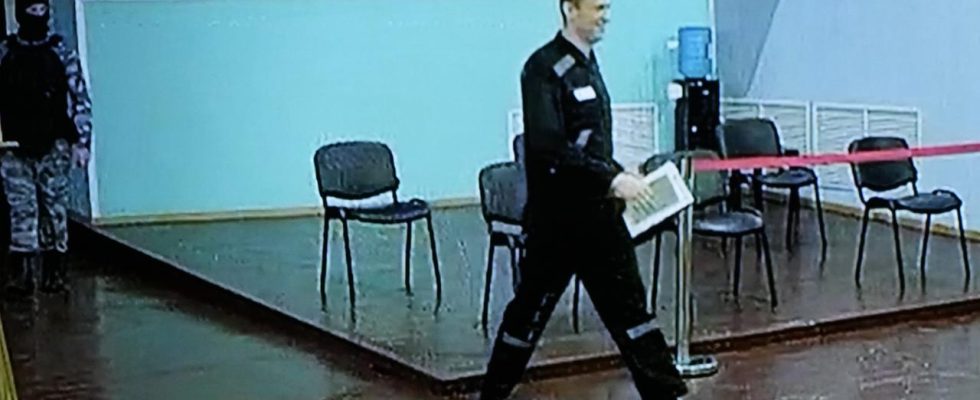A Russian court has sentenced the imprisoned Kremlin critic Navalny to a camp in the “special regime”. It is the hardest form of detention – and the next process is already threatening.
Microphones and cameras aimed at a TV screen, journalists are tightly packed in a small room of the penal colony in the Vladimir region. On the screen they see a gymnasium with walls painted light green, typical of Russian prisons. The Moscow court, which has traveled here to penal colony number six, more than 200 kilometers east of the capital, sits at desks. Alexej Navalny also comes into the picture, emaciated, in his dark blue prison uniform.
After the verdict was announced by judge Andrei Suvorov, the catastrophic sound quality initially made it unclear whether the correspondents – including those from the TASS and RIA Novosti news agencies – heard correctly. They are the first to report: 19 years in prison in the “special regime” for Navalny.
When asked by the dpa news agency, Navalny’s spokeswoman Kira Jarmysch explained that the verdict should mean the total length of detention; So the nine years of prison camps to which Navalny has already been sentenced are included. But the written verdict remains to be seen, she said.
Hardest form of detention in Russia
The verdict against Navalny came after a secret trial: he was charged with founding and financing an extremist organization and involving minors in life-threatening acts. The public prosecutor’s office only demanded a little more, namely 20 years in a camp in the “special regime”.
This, the toughest form of detention in Russia, has now been imposed on Navalny. Dangerous repeat offenders are usually locked up in this way – in remote locations, with stricter controls and fewer contacts with the outside world.
In fact, some supporters of the Kremlin critic came to the gates of the penal colony where Navalny is being held. They were also denied access to the improvised courtroom. A man in his 50s told a Russian online media: “I salute and hope that Navalny will endure all these torture conditions. You can criticize him, you can condemn his actions, but he was and continues to be cruel and unfair, degrading methods of punishment exposed.”
“Do not lose the will to resist”
Even the 19 years in prison for founding and financing his anti-corruption foundation should not be the end of the punishment for the once prominent Putin critic who was later poisoned in Siberia under unclear circumstances. For example, Navalny himself had already put on record before the verdict that another trial against him was being planned – for terrorism, it would be another long prison sentence.
In a message circulated on social networks after the verdict, he appealed to the Russians for their courage to resist. “Putin should not achieve his goals. Do not lose the will to resist,” said Navalny after the judge’s verdict. The punishment is not intended for him, but is intended to spread fear among the Russian population: “They want to get you to leave your Russia to this gang of traitors, thieves and villains who have seized power without a fight.”
“19 years in a colony with a ‘special regime’. The number doesn’t matter. I understand very well that, like many political prisoners, I’m serving a life sentence,” said Navalny. Lifetime means either the duration of his own life or the “lifetime of this regime”.
Chances of an appeal low
The verdict did not receive much public or media attention in Russia’s state media. A government-critical Telegram channel from Moscow reported an increased police presence around Pushkin Square. So far, however, there has not been a rally at the traditional meeting place for opposition members.
Alexei Navalny can appeal the verdict. However, several recent cases have shown that the prospects for a correction are extremely slim.

